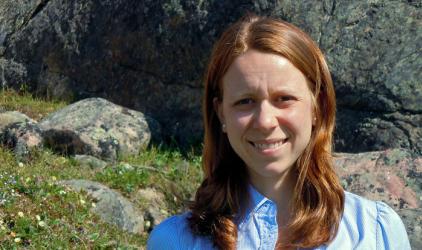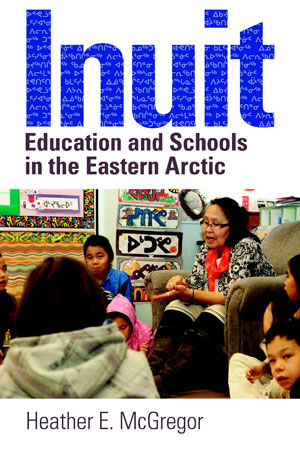History, Education and Nunavut (Heather E. McGregor)

As an incoming PhD student, my research is evolving from documenting the history of education in Nunavut to examining current developments in historical consciousness and history education in Nunavut schools.
During my Master’s work at the Ontario Institute for Studies in Education at the University of Toronto (OISE/UT), I was fortunate to be supervised and mentored by Ruth Sandwell. Her “History Wars” course, which first introduced me to changing trends in Canadian history education, would eventually contribute to shaping my PhD research intentions. At the time, however, my research focused on documenting the little-known stories of educational change in the Arctic.
Thanks to Dr. Sandwell’s encouragement, my research resulted in the publication of Inuit Education and Schools in the Eastern Arctic (2010) with UBC Press. The book takes a broad view of the history of education, beginning with traditional Inuit education and tracking changes through to the present in policy, curriculum, pedagogy, language of instruction, cultural content, and parental involvement. Focusing on the themes of cultural negotiation, decision-making power and the role of tradition in education, the book’s purpose is to identify points in history when approaches to education best reflected Inuit culture, traditions, and their vision of the future.
Returning to work in Nunavut after studying in Toronto was important to shaping my interest in further research. Coordinating implementation of the 2008 Nunavut Education Act for the Department of Education allowed me to more fully understand the challenges of transitioning vision and policy into changing practice in schools and classrooms. I also observed two trends: ongoing difficulty keeping students engaged at the secondary level and a growing engagement with history in communities - a new willingness to explore the legacy of a past characterized by traumatic change as well as remarkable resiliency.
I believe this is an important opportunity to work with educational leaders in Nunavut to learn  about, develop and implement initiatives to promote historical consciousness and historical thinking skills in ways that are relevant to Inuit communities. Under the supervision of Penney Clark and Peter Seixas, the intent of my doctoral research is to examine how history education, delivered through curriculum as well as educator development programs, could be enhanced and extended to better reflect current research into successful history education tools and approaches.
about, develop and implement initiatives to promote historical consciousness and historical thinking skills in ways that are relevant to Inuit communities. Under the supervision of Penney Clark and Peter Seixas, the intent of my doctoral research is to examine how history education, delivered through curriculum as well as educator development programs, could be enhanced and extended to better reflect current research into successful history education tools and approaches.
I also have two small research projects underway now: developing profiles of three schools in Nunavut to inform case studies under the ArcticNet grant Inuit Qaujimajatuqangit and the Transformation of High School Education in Nunavut, with Fiona Walton, principal investigator; and “Nunavut’s Education Act: Education, Legislation and Change in the Arctic,” an article I submitted to an upcoming issue of Historical Studies in Education, guest edited by Ruth Sandwell, which places the recent in the context and history of educational change.
I am very much looking forward to becoming part of the learning community at UBC, particularly through association with the Centre for the Study of Historical Consciousness and The History Education Network. I am also grateful to the Social Sciences and Humanities Research Council for their generous support of my research.

